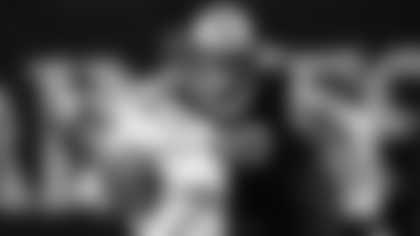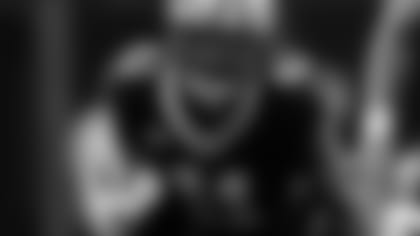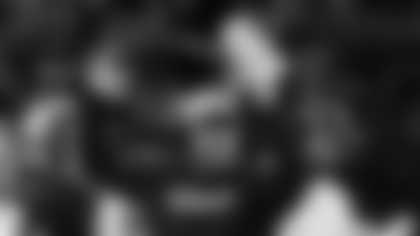New Orleans Saints C/G LeCharles Bentley
Legends Microsoft Teams Video Call with New Orleans Media
Friday, July 10, 2020
Can you talk about the end of your playing career and starting Offensive Line Performance in 2008?
"Oh boy, I actually started the business in Cleveland and if you're not familiar with Cleveland, it is a place that everyone brags about being from, because they want to look cool. But that's my actual hometown. When I started the business, I built it in Cleveland first. My exit from the league was a little unique. In some regards, I wasn't quite ready to go, probably like every single player, but I had no choice because physically I just was not in a place where I can be myself through injury and some issues with staph infection and whatnot. I did not lose the passion to still want to be involved with the game, but I wanted to be involved with the game and not just the typical way in terms of coaching or just getting right into broadcasting. I wanted to do something different and wanting to do something a bit on my own terms. So with that being said, I spent a lot of time studying and learning about biomechanics, anatomy, strength and conditioning, just understanding how the body functions at the highest and most optimal levels. So a part of those studies were self-centered in the sense that I was doing them for myself and for my overall quality of life because dealing with those injuries and what I was dealing with in terms of the aftermath of the affections, just my overall quality of life, wasn't exactly where I wanted it to be from a physical standpoint. So a lot of those studies were, again, it was for myself, but it was also a part of the journey that has led me to where I am today in terms of OLP, the training side of what we do. So I started the business in Cleveland, with the intent of just working with high school athletes. I got a bit of a culture shock in a sense that, being naive in terms of just business in general and business practices and understanding how the game of football relative to how coaches thought, it was a bit surprising and the surprise was the fact that many coaches, especially at the high school level, are extremely territorial. They don't like other people, regardless of who you are, what your credentials may or may not be, they don't like other people around their kids. So I had very difficult time getting the business off the ground in terms of building it from an athlete standpoint. So what ended up happening is the business actually began to take off because I ended up with a few Pop Warner kids. So these kids were between the ages of six and eight, nine years old. That was my first group of young athletes that I was able to touch and really work with, but it was truly a blessing for me because again, being naive, being a former player that assumed I knew the game, which I knew the game, having learned so many different skill sets because of again, investing the time and educating myself and becoming more well-rounded in terms of a strength and conditioning and performance enhancement. What I did not know is I had no idea how to teach. I think that's a common pitfall for many athletes is that we assume that we know what we know, which is the truth, but we don't know what we don't know. And so having these young athletes in the building for me was the best thing that ever happened. It was a humbling experience and I had to take a step back and it wasn't exactly within the scope of the business plan, but at the same time it was the best thing that happened because I learned that I didn't know all the things that I thought I knew. So I had to learn how to teach. So when you are dealing with young athletes, you have to be able to take information, break it down, make it entertaining, fun, and something that they can adapt to quickly. I did not know how to do that so dealing with those young athletes really helped me develop a skill set that I did not think that I would ever need, but it was the best thing again, that ever happened to me. Over the years, I started ending up with a few college players that were transitioning out of college and getting ready for the NFL. And then about four years into the business, I looked up and there were about 20 professional athletes in the building, maybe one or two high school kids, I still could not get a high school player and a bunch of Pop Warner kids. So that's how the business really started. And after about four years in Cleveland, I realized I had a product that worked, it was viable. That's when I decided that I wanted to now move back to Arizona because once you got back to Arizona, I had more resources of things that I could really tap into to continue to expand and grow the business."
You're heavily involved with the NFL Way to Play initiative. Can you share what that is and how you've kept athletes engaged during the COVID-19 pandemic?
"Yeah, with the Way to Play, the whole mission of the Way to Play is to eliminate unnecessary risks within the game. I think that that is something that's going to really help us in terms of keeping the game evolving and making sure that the game stays around. In regards to the whole pandemic, the virtual training system that we put together has really been a key element of keeping the athletes ready in terms of when they get back to their respective coaches. There are now at least at a baseline state of readiness versus just keeping athletes at a very sedentary state. And when they get back to their coaches, they're starting not just from baseline, but they're now working from a complete deficit. So the function of that was to keep the core engaged, keeping and maintaining a level of explosion, but obviously all without the implementation of heavy weight room equipment, it was the rubber band based, a towel, a lot of different type positions. So again, it was just the minimum approach, but at the same time was functional regards to the demands of our sport with just football."
I know, this is kind of an odd question since most good memories don't come in training camp, but do you have a favorite training camp memory there on the field or maybe some team bonding that happened off the field?
"My favorite training camp memory had to have been my very first day of training camp in New Orleans. It was in Thibodaux, Louisiana at that time and I remember the heat, the humidity, it was a bit more than I was expecting. So I took the same approach I'd take getting ready for practice that I took in college. I put on my knee braces and ankle supports and all these gadgets that you put on to protect yourself, we got about halfway through warmup and I literally felt like my body was melting and my knee braces literally slid off of me. My ankle braces, someway somehow became completely untied. It was really one of those welcome to the NFL moments and not just welcome to the NFL, welcome to Louisiana. Being from Ohio and having all of your training camps in Columbus, that humidity, it's a whole different world that you are dealing with. So again, it was one of those things where I learned how to become a minimalist really fast in the NFL. Then next thing you know, I'm not wearing ankle braces anymore. I'm not wearing knee braces anymore. I am just keeping the bare minimum amount of equipment on as I could."
What was kind of the origin for you deciding to start an agency up and how's that been going for you so far?
"Well, the agency has been going great. It's really been a part of the DNA of what we've been doing over the last 11 years. Kind of getting back to the inception of OLP, when I started taking on young college players, I was taking on players that didn't have quote, unquote pedigree. So a lot of those guys who are going to be just undrafted. So with that being said, there weren't a lot of agents that were sniffing around them and willing to invest money into them. So what I was able to do at that point in time was to begin to hand pick a few college players that I thought were really good players, but just slightly overlooked. If I had to go to the D2, one AA level to find players I would do so, but I also knew that if I were to bring those players in, it was going to be an investment that I was going to make into those players. So in lieu of those players having agents, I would make the investment from a business standpoint into those players. And so how the compensation at that point in time was just all sweat equity. So if the players made money, then I'd make money, but you would have to pick the right people and make the right investment. And sometimes like dealing with any type of a piece of real estate, so to speak, sometimes you win, sometimes you lose. But I was in a position where I knew I had a product where I had something tangible in the sense that if I thought a player was good enough, if I could work with them, they'd trust me, I'd trust them that there will potentially be a corporate ward on the back end. The player would have the career that they wanted and I would also be able to share in the windfall financially that the players would then attain and rightfully so. As the years have kind of gone by, I have built that model in itself, that self-contained model, I have never become an agent myself, but I have managed the careers of so many players over the years that I finally decided that, look, this is what I want to do. And be able to provide a higher level of service in house, to all our athletes and specifically to offensive line athletes. So again, what we provide to the players is a truly tangible service I'm of the belief that at the end of the day, nobody in this business can quote, get a player paid. players get paid based on performance, not because the agent or whomever it is says, well, I want Johnny to get $10 million. Well, that's nice that you want that, but that player has to have that value and the services that we've provided and built out over the years, it's tangible. We have an opportunity to really provide something to the athlete that can increase and impact of player's performance, that can make a more well-rounded human being that's more positioned to transition into life after football, being able to take those tangible and intangible skills you develop as a player and began to implement them in life. So with all that being said, the agency is going extremely well. We have about 20 clients right now, and I love it. I think that right now, this is where I'm supposed to be and providing this type of service and mentorship to these young men has really been a part of my calling him at this point in life."
So are you actually a certified agent now?
"No and I never want to become one of those. We have an agent on staff and he's our lead contract advisor. He's NFLP certified and what we're working on right now, we have a couple of players that are in that retirement phase and are now getting ready to begin diving into that world. So again, these are players that have been with me for nine, 10 plus years of their careers that are getting ready to transition out and they're about transitioning over to player representation. So everything we do is built around this little ecosystem, this little bubble where it's trust, it's continuity, it's relationships. And I know that term, it's all family. Yeah, it's family, but at the end of the day, you still run a business. I'm 1000% a capitalist, but at the same time, I want people around me that I can trust. I want people around me that are around for the right reasons, which is giving back to the game and giving back to players."
Why do you specifically work with offensive lineman?
"Because they're the smartest, coolest people on earth (laugh). Outside of me being a smart ass it's because number one, it's who I am. It's twofold. From a personal standpoint, I enjoy being around people that are likeminded and generally speaking, I feel the mentality of an offensive lineman is representative of not just the mentality within the segment of our game of football. It is an everyday man/woman mentality. The offensive lineman, they're the person that's going to get up in the morning, they're going to put their boots on, put on a hard hat. They're going to get all of the blame and very little of the credit. And they do all of the work to benefit the people around them. And if we take that same reality and we just put it into the real world, so to speak, that's the garbageman. That's the mailcarrier. That's you guys as well. That is society. That's the people that make all world and our country what it is today. It is that same mentality, that you are going to get up in the morning. You're gonna work your butt off. You are going to do all the things that are not necessarily going to benefit you, but they are going to benefit the whole. So with that being said, what makes offensive lineman unique to me is look, yes, they are these big strong men and even women, but they're also the everyday common person. So I am not someone that is uppity and all that type of stuff. I consider myself a common person. So the people I want to surround myself with, I want to surround myself with people that are like me. They're like the people in my community that I grew up around, like my mom, that I'm like my dad. And they just so happen to be, uh, offensive lineman fit that persona. So living in that world, it keeps me around people that I'm extremely comfortable being around. I'm sorry, I think quarterbacks are great, but I don't want to be around some of those types of guys now. Especially if we start talking about wide receivers, unless it's Michael Thomas, he's different, he is built like an offensive lineman from the neck up, he is that guy. But if you start talking about the other positions and we started getting into the performance world, I just don't want to be around people that aren't focused on the main thing. And the main thing is taking your career and really building something special and unique for yourself and your family. I'm not interested in how big your chain is or how, you know, what color your car is, how big your rims are. I love going to our facility each and every day. And I see six, four trucks out there. To me that's everyday common person. And I love being around that from a business strategy standpoint, it's a niche market and living in my world of a niche market and being an expert at being able to service this particular niche market, it creates a competitive advantage for me. So by being very focused in a specific area, it allows me to continue to expand and own that respective lane. So when it comes down to representing offensive lineman, it comes down to training. It comes down to content creation. I'm able to live in that world and be a sought after expert in that world. It's from a business strategy standpoint, it does create an advantage."
Whether it's on the offensive line or elsewhere, in training camp this year for the Saints is there a specific position battle that you're going to be looking for on offense this year?
"I'm excited to see the young guy though, Cesar Ruiz, what he is going to be able to do. I know that Larry Warford is no longer there. And I think that Ruiz has played guard in the past. And I know he's a collegiate center and a very good college center, but also think that (Erik) McCoy was a really good rookie last year, had a great season as a rookie center, I think he has a tremendous upside to him. So between that right guard spot and that center position, I'm curious to see how they work out that battle so to speak of, who's going to be the guard? Who's going to be the center? Because that offense is predicated on having big, strong guards that can maintain that pocket. And it's going to be interesting to see considering the fact that a young guy hasn't had OTAs, he hasn't had any minicamps. We haven't had any exposure to what it is to be in the National Football League to throw a young rookie (in) that's not going to be transitioning potentially from one position to another, at the highest level in the world with so little true preparation in terms of the year that we've been dealing with. It's going to be interesting to see how that works out. Another part is where they move (Erik) McCoy to right guard, which I think wouldn't probably be the best thing for him, but that's none of my business. I'm just curious to see how it all plays itself out."
How has the New Orleans Saints organization changed since when you left after the 2005 season?
"I think it has been unreal to watch how the franchise has transitioned. My experience in New Orleans, no, we didn't win a lot of games, but to be honest with you, being of the NFL is a win enough. Being around some of the guys that were in a locker room, Joe Horn, Deuce, McAllister, Victor Riley. The list goes on and on and on, but to be around some of those guys and have that opportunity in that chapter of my life to be in a city like New Orleans. Oh my God, it was a bit surreal, but again, we didn't win. The culture wasn't exactly one of success. But again the experiences, you couldn't put a price tag on it. Now to see what the organization has become through Sean Payton's leadership, (and) Mickey Loomis's consistency. I think that the organization is now truly a representation of the city and the state. Meaning those people, the fans. They're finally getting what they deserve in terms of our product. One thing I know about New Orleans and I love about it, is the fact that whenever you go, it's consistent, you know exactly what you're going to get. You go down to the French Quarter, you know exactly what you are going to get and you know what to expect. You go to any restaurant, you know exactly the service you are going to get, you know what to expect. So, there is a level of consistency within the city I think is a part of the fabric, as a part of the DNA. Now that consistency has not always been, emblematic of the sports teams, but now with Sean Payton and Mickey Loomis' leadership, I think you now can say each and every week, each and every season, you can expect the Saints to put out a highly competitive product each and every week. You expect the Saints to win it, not just show up, but win. So now there's consistency there and the fans, they deserve that. It's now truly represent a true representation of what that city is about. You know, when you now have guys like Michael Thomas, you know, as I said, I think skill guys are a little bit different, but when you think of a guy like a Michael Thomas, you know, he's, emblematic of what that city is about. Yes, he's consistent. He's great. He's all these things you talk about being an athlete, but he's a normal everyday guy. He knows and understands how to work. That's what that city is about. They understand how to work. There is a respect level there for that team, that city and that state that I think's really bled over into the product each and every week. And for me to watch it, it is cool to see. I think for a little bit, I was a little jealous that I wasn't able to be a part of it, but again, it's like, you know, my last year at Ohio State, we weren't very good. The next year they won the National Championship, go figure. The same thing in New Orleans. I left New Orleans and I think a couple years after that they want a Super Bowl, go figure. So I'm always a part of, as I like to say, you know, the bootstrapping of organizations and then when things finally get going, I'm no longer there. So woe is me, I guess."
You had a bout with MRSA and I know that was difficult for you. How do you teach the young, offensive lineman under you, how to be to be safe from a hygiene standpoint?
"Yes. Well, my situation is a little bit different, uh, in terms of my infection, it was more surgically based, but one thing that we are very mindful of with our players is teaching them how nutrition plays a significant role in your overall immune health. In fact, we just had what we call a player empowerment series. They're like little Ted talks for players. We bring in an expert in the respective field and have them give some information and context on any particular situation is going to be beneficial to the player today and all for life after football. So the one that we had just recently on Wednesday, we had a doctor from Thorne, he's the lead medical expert from Thorne, one of the major supplement companies here in the country came in and talked to the guys about managing their immune system in the era of Covid. But with that being said, the one key element of that is number one, understanding how the immune system functions and then number two, understanding how you can manipulate the new system through nutrition, through hygiene and through proper sleep patterns and behaviors. So being able to provide that type of information to players is something that we pride ourselves on. Not specifically in regards to, uh, MRSA, you know, there's not a whole lot that you can do. Because it's one of those things that, when someone's having a surgery, you just hope that you put them in the best position where at that particular hospital, that particular surgeon doesn't have a track record of doing things halfhazardly. But in terms of just everyday life, just understanding how your immune system works and that your immunity's going to be a significant component to who you are as a human being. And then obviously, your performance levels as an athlete."














